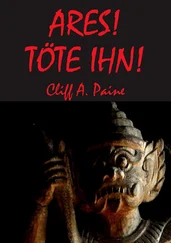“Sweetness.” Among the chorus of dissimulations, Little Pretty One was like the single blue thread in a beige prayer shawl. “I’ve something to tell you.” Closer now, only the mirror beyond the next mirror beyond the next mirror. “I’m not your sister.” Catching up. She was catching up. “I’m not really from this world at all, well, actually, I am, but that’s kind of complicated.” Sweetness charged into a decagonal chamber of mirrors. Whisper of aluminium on glass: she turned, a mirror slid across the entrance. Each mirror held the image of Little Pretty One.
“So who the hell are you, then?” Sweetness gasped. Sweat beaded juicily down her ribs. The ten Little Pretty Ones looked back at her.
“I’m Catherine of Tharsis,” they said.
“She’s absolutely right, you know,” Devastation Harx said from behind her as Sweetness panted and stared, senseless with confusion.
Sweetness turned to the sound of the voice. Devastation Harx stood resting a languid hand on the top of a mirror. He twisted it toward him. The nine remaining Little Pretty Ones vanished.
“It was this one.” He unhooked a clasp. The mirror rolled up like a flapping cartoon comedy blind. Sweetness had one glimpse of Little Pretty One’s mouth and eyes, open in shock, then the flying preacher squeezed the scroll of mirror into a stubby tube, screwed it into a verdigrised metal canopic jar and screwed on a top like a winged helmet. “I may not command angels, but I do command the one who commands the angels. I think that makes it a fair fight.”
She dived for him. Her clawed fingers raked through Devastation Harx like a hunting merlin sliding down the air. She hit the glass floor hard. Winded. Sweetness rolled on her back. Devastation Harx was a tiny figure silhouetted against the glowing rectangle of a daylit door. Sun glinted from his silver froggings. He pointed the copper jar at Sweetness.
“Did anyone ever tell you, Ms. Engineer, not to trust too much to appearances? Well, I have what I need, and you, I’m afraid, are quite surplus to requirements.” He took an object like a large pear with a clockwork key in the top from inside his frock coat. “Goodbye, Ms. Engineer.” He turned the big brass key. Sweetness felt the floor shift beneath her. She scrabbled for fingerholds but the glass sheets of the mirror maze floor were fitted with molecular precision. She was slipping, sliding. Sweetness snatched at mirror frames but the floor was now past thirty degrees and gravity was drawing her ever faster downward. A slit of light appeared beneath her feet, a line of white that widened into a slot of red, then opened on to a cinema screen of red desert. With a wail, Sweetness Octave Glorious Honey-Bun Asiim Engineer 12th was spat from the hatch that had opened in the belly of Devastation Harx’s flying cathedral like a gobbet of drool from Grandfather Bedzo’s mouth. She arced gracefully through the air. I’m flying , she thought, and then, stupid stupid stupid, birds fly, girls fall, I’m not flying, I’m falling. Out of the bottom of a big airship that, the last time you looked, was way up high over red rocks. This is it, Sweetness Octave Glorious Honey-Bun Asiim Engineer 12th. This is absolutely the last… The ground emphatically interrupted her reverie. The thud might have convinced her she was dead; the pain told her she was not. She rolled on to her back, looked up and saw the belly hatch close, three metres above her. The whole bulk of Devastation Harx’s mobile empire hovered above her, as if it had somehow, most surprisingly, grown out of her navel. Sweetness blinked, pained, stunned, dazed to find herself still alive. Dust milled up around her. Sudden wind tugged at her dreads. Propellers clanged down into vertical orientation. In their translucent teats, purple people wearing skin-hugging shorts leaned to their handlebars. Grit whipped Sweetness’s face. The cathedral ascended away from her, like a dream lifting from you in the morning light. It turned to the southwest. Rotors swivelled to horizontal flight. Still climbing, Devastation Harx took his leave.
Sweetness pulled herself on to her elbows to watch the great cathedral disappear beyond the serrated rimrocks. Ribs grated. She coughed, no blood. No breakage. She looked at her feet. Then she looked at the world framed by her feet. From sole of her desert boots to near horizon was rippled red sand. Beyond that, reefs of harsh stone rose to the stripes of yellow and indigo evening cloud that barred the belly of the flying cathedral. Fingers, fists, twisted spires and candysticks of rock, so contorted and weathered they seemed less firmly connected to the ground than the clouds. She looked again at her ten-to-two feet. They seemed hopelessly inadequate for the landscape.
“Well,” she said. “Terrific.”
15

Dazzled by winks of sun from the rim of the silver tea bowl, the boss tanager kept his herd in pace with the slow train. They were handsome beasts, Grandmother Taal admitted, grown sleek on the well-watered Quela rangelands. Muscles moved smoothly under close-fitting striped skins, like acrobatic carnival punchinellos. They had never felt the seat of man, but each bore a patterned plastic ear-tag: owned, numbered, one day to be herded by harrying autogyros, driven up ramps on to a train like this, then taken to the breaking fair at Tzaena-tzaena.
So much for the wide country and the wilds. Grandmother Taal set down the maté bowl, eclipsing the hypnotising blink of sun. The tanagers cantered on, hog-manes bristling, ownership tags rattling. Herd things like to run. Such is their weakness.
The observation car was a glassine cyst on the spine of the last carriage of the ambling High Plains Cruiser, an eccentric rural service out of Hagios Evangelis that stopped at every hillock and hollow before finally creaking to a terminus at Mosquiteaux on the edge of the Big Red. People got on, rode a time, got off, so that the train, though it had many passengers, was never busy. Few went the whole distance. Grandmother Taal was one such transient. The Triskander-Grand Valley Limited Night had made an unscheduled request stop at Strophé, where she had thumbed down the High Plains Cruiser fifty kilometres into its journey. She would ride this train as far as signal NW two twenty-four, then pull an Uncle Billy on the twenty twenty-seven fast mail across the eroded craterlands of Old Deuteronomy.
Therefore, the observation car was sparsely populated. Grandmother Taal had a club booth to herself, to rest her feet on the leatherette banquette, sip her maté through a silver straw, watch the frankly uninspiring landscape flow past, doze and snore knowing that her nearest neighbour, a florid-faced milch-man in quaintly traditional bib-suit and paddy-hat, was five rows away and deeply engaged with the stock prices in the daily gazette. Five rows ahead of him a group of elderly people in funeral whites played cards and nodded gravely to each other. The car’s only other occupants were a family of musicians by the down stairs, making quiet tunes with guitar, zither, tabla and soft handclaps. Strange people, musicians; so much of their souls given out to their creatures of wood and skin and metal, that demanded so terrible a possession when they took them up to play.
Passenger, she decided, is another thing entirely from track, but by no means inferior. She looked out at the rolling green grass and the cantering tanagers. Their perfect mindlessness lulled her off to sleep.
A tinny clink woke her. A boy’s face loomed over hers, close enough to read his teeth stains. He held up the maté straw and set it in the tin bowl. Hairbrush epaulettes and crimson rick-rack around his lapels identified him as a Stuard.
Читать дальше













